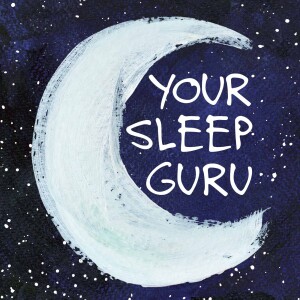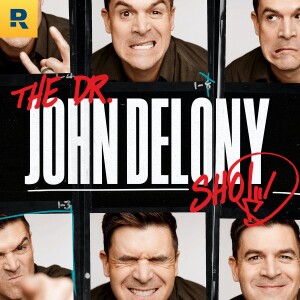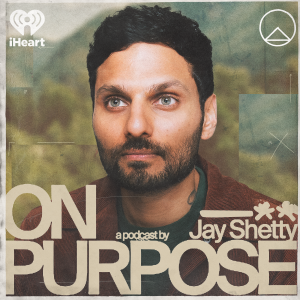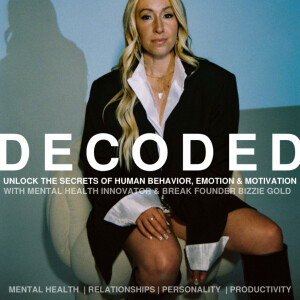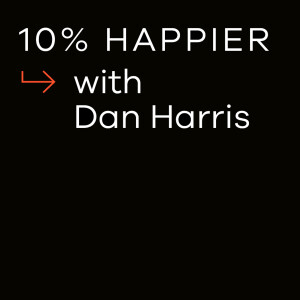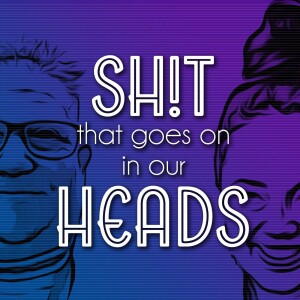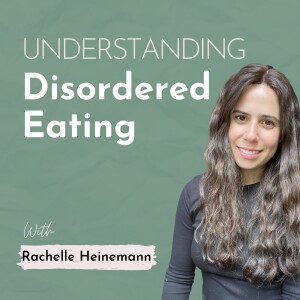

Understanding Disordered Eating: Eating Disorder Recovery and Body Image Healing
https://understandingdisorderedeating.libsyn.com/rssEpisode List

178. How to Quiet the Food Noise
Have you ever felt like your mind just won't shut off about food? You're in a meeting, at school, or out with friends, and instead of focusing on what's in front of you, all you can think about is what you'll eat next, what you shouldn't have eaten, or what you'll allow yourself later. That constant mental chatter, what many call food noise, can be exhausting. Tune in to the full episode to uncover what food noise is really telling you, and what steps you can take to finally quiet it. Tweetable Quotes "Thinking about food and being interested in food is really another sign of physical hunger." - Rachelle Heinemann "Restriction applies to the actual restriction of food not getting in enough, and it applies to the restriction of kinds of foods, types of foods, and the idea that they're off limits." - Rachelle Heinemann "Once you start eating adequately and regularly and consistently, and allowing yourself to have a variety of foods, then you'd be surprised how the food noise starts to quiet." - Rachelle Heinemann "If we still have our good foods and bad foods in different camps, then the food noise will probably be there." - Rachelle Heinemann "The more you avoid sweets and cakes and all these other kinds of fun foods, it's going to hold that power over you." - Rachelle Heinemann "The most important takeaway from today is 'Are you restricting? Is there some dieting going on? Are there lots of food rules?' In which case, you have to address that in order to decrease the food noise that is driving you up the wall." - Rachelle Heinemann Resources Bergen Mental Health Group Inc. is hiring! If you think you'd be a great fit, check it out! Grab my Journal Prompts Here! Looking for a speaker for an upcoming event? Let's chat! Now accepting new clients! Find out if we're a good fit! LEAVE A REVIEW + help someone who may need this podcast by sharing this episode. Be sure to sign up for my weekly newsletter here! You can connect with me on Instagram @rachelleheinemann, through my website www.rachelleheinemann.com, or email me directly at rachelle@rachelleheinemann.com Thank you to our sponsors! This episode includes paid endorsements and advertisements for products and services. Hidden River Healing provides compassionate, residential eating disorder treatment for girls, adolescents, and young women. Their expert clinical team emphasizes family involvement and individualized care in a beautifully designed facility surrounded by nature — a peaceful environment that supports recovery and lasting healing. Program Highlights: Specialized care for ages 8 and up, including a dedicated house for Emerging Adults (21+) and Mid-Life Adults In-network with most commercial insurances Ability to treat NG tube patients Learn more: hiddenriverhealing.com/about-us Follow on Instagram: @hiddenrivertx

177. What Does Treatment for an Eating Disorder Actually Look Like?
When it comes to eating disorder treatment, one of the biggest questions people have is simple: What does it actually look like? The reality is that there's no single answer. Every person's story with food, body image, and recovery is unique, which means treatment has to be flexible, supportive, and tailored to the individual. Still, there are common building blocks that show up again and again, and understanding them can make the process feel a little less overwhelming. The number one goal is eating disorder symptom reduction. That means consistent and adequate nourishment as the first and most important goal. Tweetable Quotes "No two eating disorders are going to look alike. No two people's stories are going to look alike." - Rachelle Heinemann "The relationship we have with our people is going to be the catalyst for change." - Rachelle Heinemann "Just because the numbers are good doesn't mean there isn't still an eating disorder." - Rachelle Heinemann "Even if somebody starts to show signs of decreased symptoms, it doesn't necessarily mean that the work is over." - Rachelle Heinemann Resources Bergen Mental Health Group Inc. is hiring! If you think you'd be a great fit, check it out! Grab my Journal Prompts Here! Looking for a speaker for an upcoming event? Let's chat! Now accepting new clients! Find out if we're a good fit! LEAVE A REVIEW + help someone who may need this podcast by sharing this episode. Be sure to sign up for my weekly newsletter here! You can connect with me on Instagram @rachelleheinemann, through my website www.rachelleheinemann.com, or email me directly at rachelle@rachelleheinemann.com

176. Body Image with Sydney Greene, MS, RDN
Ever feel like nothing in your closet feels good, no matter how many outfits you try on? Or maybe you've found yourself spiraling about what people will think when they see you at a reunion, a wedding, or even just in the office. In this episode of Understanding Disordered Eating, I'm joined by my good friend and colleague, Sydney Green, MS, RD, to unpack the truth about body image: what it really means, how it shows up in daily life, and why it's so intertwined with our relationship to food. Tweetable Quotes "If you're on outfit seven, nothing's feeling good… can we just go with comfort? Can we just go with, okay?" - Rachelle Heinemann "Body image is the last to go… which again, I don't even know what that means, although it's true, but it doesn't really mean much without unpacking it." - Rachelle Heinemann "The successful woman is looking super chic, and she's really thin, and if I don't look like that, then I'm not successful. I'm not driven. I'm not motivated." - Sydney Greene "A huge salad… our stomach is not meant to digest that. We're not rabbits. It just sits there. We get bloated. It doesn't feel good." - Sydney Greene "Body image is not a symptom. It's like how we feel about ourselves… there's so much more richness to how we feel about our body." - Sydney Greene "There's an actual word for some of this in research, it's called fat talk… women get together and talk about, pick apart their body, kind of like that Mean Girls scene." - Sydney Greene "When somebody is struggling with body image, maybe the point is not to immediately erase it. Maybe we have to see it and acknowledge it and say, you're not alone." - Rachelle Heinemann Resources Connect with Sydney here: https://www.sydneygreenehealth.com/ Find her on Instagram!: @greenehealth Bergen Mental Health Group Inc. is hiring! If you think you'd be a great fit, check it out! Grab my Journal Prompts Here! Looking for a speaker for an upcoming event? Let's chat! Now accepting new clients! Find out if we're a good fit! LEAVE A REVIEW + help someone who may need this podcast by sharing this episode. Be sure to sign up for my weekly newsletter here! You can connect with me on Instagram @rachelleheinemann, through my website www.rachelleheinemann.com, or email me directly at rachelle@rachelleheinemann.com

175. Real Recovery and How to Get There with Carolyn Costin, MA, MEd., MFT, CEDS, FAED
What does it really mean to be fully recovered from an eating disorder? For decades, the conversation has been clouded by vague definitions, conflicting philosophies, and the fear that "recovery" might not even be possible. In this powerful conversation, I sit down with Carolyn Costin, a renowned therapist, author, and pioneer in the eating disorder field, to dig into what recovery actually looks like, why she believes full recovery is possible, and how to strengthen the "healthy self" rather than fight against the eating disorder voice. Carolyn Costin MA, MEd., MFT, CEDS, FAED, is a world renowned, highly sought-after eating disorder clinician, author, and international speaker. Recovered from anorexia in her twenties, as a young therapist Carolyn recognized her calling after successfully treating her first eating disorder client. Carolyn was first to publicly take the position that people with eating disorders can become fully recovered. Tweetable Quotes "When you are recovered, you will not compromise your health or betray your soul to look a certain way, wear a certain size, or reach a certain number on the scale." - Carolyn Costin "We are not born with an eating disorder. We were born with this core healthy soul self in there." - Carolyn Costin "Instead of getting rid of the eating disorder self, I help strengthen people's healthy self." - Carolyn Costin "When someone has had an eating disorder, I want to be cautious for a while, but I know so many people now being in this for so long who are recovered and shit's happened in their life… and not slipped back." - Carolyn Costin "I don't weigh myself. It's like a feminist statement." - Carolyn Costin "We have to be careful… but my experience is people who are recovered actually navigate it better because we've already been through all that and it's like we have a bit of a shield up for it." - Carolyn Costin Resources Visit Carolyn's website - www.CarolynCostinInstitute.com Bergen Mental Health Group Inc. is hiring! If you think you'd be a great fit, check it out! Grab my Journal Prompts Here! Looking for a speaker for an upcoming event? Let's chat! Now accepting new clients! Find out if we're a good fit! LEAVE A REVIEW + help someone who may need this podcast by sharing this episode. Be sure to sign up for my weekly newsletter here! You can connect with me on Instagram @rachelleheinemann, through my website www.rachelleheinemann.com, or email me directly at rachelle@rachelleheinemann.com

174. Is This An Eating Disorder or Disordered Eating?
Have you ever wondered where the line really is between disordered eating and a true eating disorder? It's not always as clear as we'd like to think. In fact, so much of what we consider "normal" in diet culture—tracking every bite, stressing over body image, or skipping meals in the name of health—can feel harmless at first… until it slowly starts taking over more and more of your life. If you've ever asked yourself, "Is this just disordered eating, or is it something more?", this conversation is for you. Tweetable Quotes "You don't have to have a diagnosable or a life-threatening eating disorder in order to qualify to get help." - Rachelle Heinemann "Think of it like an iceberg. Disordered eating is the part you can see… but an eating disorder is the entire iceberg—this massive, dangerous thing that's hidden." - Rachelle Heinemann "With disordered eating, the rules are upsetting if you can't follow them. With an eating disorder, the rules feel like commands, and breaking them feels like a moral failure." - Rachelle Heinemann "To me, one of the most important pieces to keep an eye out for is how your relationship with food is impacting your life—your work, your friendships, even your ability to leave the house." - Rachelle Heinemann "No matter if you have a full-blown eating disorder or you struggle with yo-yo dieting, there is help out of it. You don't have to wait." - Rachelle Heinemann Resources Bergen Mental Health Group Inc. is hiring! If you think you'd be a great fit, check it out! Grab my Journal Prompts Here! Looking for a speaker for an upcoming event? Let's chat! Now accepting new clients! Find out if we're a good fit! LEAVE A REVIEW + help someone who may need this podcast by sharing this episode. Be sure to sign up for my weekly newsletter here! You can connect with me on Instagram @rachelleheinemann, through my website www.rachelleheinemann.com, or email me directly at rachelle@rachelleheinemann.com
You may also like
Create Your Podcast In Minutes
- Full-featured podcast site
- Unlimited storage and bandwidth
- Comprehensive podcast stats
- Distribute to Apple Podcasts, Spotify, and more
- Make money with your podcast

